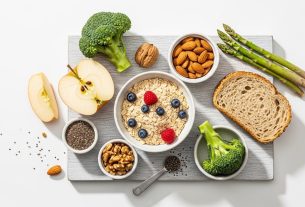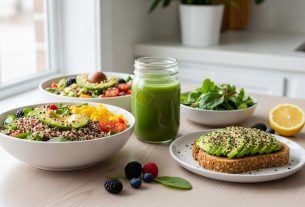Estimated Reading Time: 7 minutes
HHve you ever stopped to consider the ingredients lurking in your everyday household cleaners, air fresheners, and personal care items?
The truth can be a bit unsettling.
Many conventional products are packed with harsh chemicals, synthetic fragrances, and potentially harmful substances.
Luckily, embracing a healthier lifestyle doesn’t mean sacrificing a clean, comfortable home.
The good news is: it’s easier than ever to find effective and organic alternatives to household products that are kind to your family and the environment.
My own journey towards a greener home started with a simple cough.
It persisted for weeks, and after ruling out several potential causes, my doctor gently suggested I look at the products I used daily.
I’d never thought about it before!
I realized the air fresheners, the harsh bathroom cleaners, the laundry detergents… they were all potential irritants. It felt like a betrayal!
But it was the beginning of a wonderful learning curve.
I started researching, experimenting, and slowly swapping out conventional products for gentler, more organic alternatives.
The cough eventually vanished, and I felt a newfound sense of control over my home environment.
The benefits of switching to organic alternatives to household products are numerous and impactful.
First and foremost, you’re reducing your exposure to potentially toxic chemicals.
Many conventional cleaners contain volatile organic compounds (VOCs) that can contribute to indoor air pollution and trigger respiratory issues, allergies, and even long-term health problems.
By opting for organic alternatives, you’re creating a safer environment for yourself and your loved ones.
Furthermore, many organic products are biodegradable and produced with sustainable practices, minimizing your environmental footprint.
Finally, you’re supporting companies that prioritize ethical sourcing and transparency, fostering a more sustainable and responsible consumer landscape.
Many of the chemicals found in common household cleaners are linked to health concerns.
Bleach, for example, is a powerful disinfectant, but it can irritate the skin, eyes, and lungs.
Ammonia, often found in glass cleaners, can be just as irritating.
Synthetic fragrances, used to mask the smell of chemicals, can trigger allergic reactions and other sensitivities.
A good place to start is to read the labels on your existing products carefully.
If you can’t pronounce the ingredients, it’s a sign that they might not be the best choice.
This proactive approach will give you a good starting point and motivate you to seek more sustainable solutions.
One of the most overlooked areas is laundry.
Many detergents contain dyes, perfumes, and other additives that can linger on clothing and irritate skin.
In contrast, organic laundry detergents often utilize plant-derived ingredients and are fragrance-free.
Making the switch to organic alternatives doesn’t have to be overwhelming.
Start small, and gradually replace your existing products as they run out. Here are some simple swaps to get you started:
These are just a few examples, and the options are constantly expanding.
The more you research and explore, the more you’ll find that organic alternatives can meet any need.
One common misconception is that organic alternatives are less effective than conventional products. In many cases, this is simply not true.
For example, white vinegar is just as effective at cleaning glass as conventional glass cleaners.
Another myth is that organic products are more expensive.
While some brands may be pricier, many organic alternatives, like making your own cleaning solutions, are incredibly affordable.
Furthermore, the long-term health benefits and environmental impact of using organic products can often outweigh the initial cost difference.
Also, many people believe that “natural” always equals “safe.” This is not necessarily true, as some natural substances can be irritants or allergens.
Always test new products on a small area of skin or surface before widespread use.
Let’s dispel some common myths about organic alternatives.
First, the effectiveness myth: Many organic products, especially those with plant-based ingredients, offer just as good cleaning power as conventional products.
Another issue is the expense myth.
While some organic brands may be more expensive, you can make many cleaning solutions at home at a fraction of the cost of commercial products.
Finally, we have the belief that “natural” equates to “safe”.
While many natural ingredients are safe, some essential oils or plant extracts could cause skin irritation or allergic reactions.
Therefore, it’s always best to do a patch test on a small area of skin before fully using any new product.
Let’s delve a little deeper into some key areas where you can easily swap your existing products for healthier options.
Essential oils can be a great addition to your cleaning and personal care routines.
Tea tree oil is a natural antibacterial agent, perfect for cleaning bathrooms. Lemon oil is a natural degreaser and deodorizer.
Lavender oil has a calming scent and can be added to laundry detergent or used in a room spray.
Remember to use essential oils safely, diluting them properly with a carrier oil (like water for room sprays) before use.
Making your own cleaning solutions is a fun and empowering way to control the ingredients you’re using.
Baking soda, white vinegar, lemon juice, and essential oils are your best friends. There are countless recipes online.
A simple search for “DIY cleaning solutions” can yield a wealth of information, and it’s also a great way to significantly reduce your reliance on plastic packaging.
Experiment and find solutions that work for your cleaning needs.
Transitioning to organic alternatives to household products is a journey, not a destination.
It’s about making informed choices and gradually incorporating healthier habits into your daily life.
Embrace the process, experiment with different products, and find what works best for you and your family.
I’m confident that by choosing organic, you’re not just cleaning your home, you’re taking steps towards a healthier life and a more sustainable future.
Consider the your hair care routine and other daily habits you might want to change.
This is an approach that benefits not just your health but also the planet’s.
In conclusion, prioritizing organic alternatives to household products is a powerful way to take control of your health and well-being.
It’s a move towards a safer, more sustainable, and more vibrant lifestyle. Make the switch and experience the difference!
Frequently Asked Questions
Are organic cleaning products really effective?
Absolutely! Many organic cleaning products are just as effective as conventional ones. For example, white vinegar is a powerful cleaner that can handle many household tasks, and baking soda is a great abrasive. In many cases, these natural ingredients can be just as, if not more, effective at cleaning than their chemical counterparts.
How can I determine if a product is truly organic?
Look for certifications like USDA Organic or EPA Safer Choice. These labels indicate that a product meets specific standards for ingredient sourcing, manufacturing processes, and environmental impact.
Reading the ingredient list carefully is also crucial, and if you can’t pronounce an ingredient, it’s probably best to avoid it. Researching the company’s practices is also essential.
Are organic products more expensive than conventional ones?
While some organic products might have a higher price tag, many organic alternatives are actually more affordable. DIY cleaning solutions made with vinegar, baking soda, and essential oils are significantly cheaper than their conventional counterparts.
Plus, the long-term health benefits often outweigh any initial cost difference. Choosing organic products may even save money in the long run due to a reduction in healthcare costs linked to exposure to dangerous chemicals.
Are there any risks associated with using organic alternatives?
While organic alternatives are generally safer, some essential oils can cause skin irritation. Always perform a patch test on a small area of your skin before widespread use. Additionally, some natural ingredients may not be suitable for all surfaces. Therefore, researching and testing products is always essential.
Where can I find resources for transitioning to organic household products?
There are many great resources available! Websites like the Environmental Working Group (EWG) provide product ratings and information on ingredient safety. The EPA offers guidelines and resources for reducing exposure to harmful chemicals.
Many health and wellness blogs also provide recipes, tips, and reviews of organic alternatives to household products.



